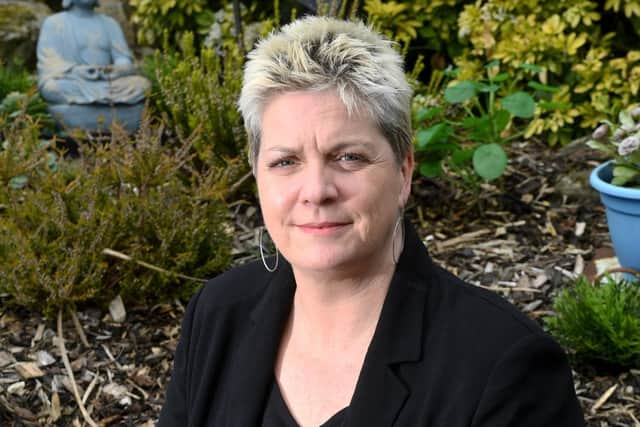Warnings ‘lockdown became a prison’ as domestic violence calls for help soar to record levels in Leeds
and live on Freeview channel 276
Domestic violence support services in the city reported seeing a “huge surge” in requests for help from victims across the city in May last year - with the total continuing to rise ever since.
Figures shared with the Yorkshire Evening Post by Leeds Women’s Aid, a city-wide charity which is also the lead agency for the Leeds Domestic Violence Service (LDVS), shows the scale of demand since the pandemic broke out last year.
Advertisement
Hide AdAdvertisement
Hide AdThe service has seen calls to its 24/7 helpline soar to 1,101 in April 2021 alone - nearly four times higher than the 322 calls it received in April 2020.


The number of referrals for refuge accommodation has also increased by 48 per cent and overall the total number of people supported by the charity has increased by nearly a third, from 5,500 in 2019/20 to 7,000 this year.
Nik Peasgood, chief executive of Leeds Women’s Aid, said it has been a challenge to keep up with demand - and there are no signs of levels dropping.
“There has been such a large increase in demand like we’ve never seen and it’s difficult to catch up with that.
Advertisement
Hide AdAdvertisement
Hide Ad“We trebled the amount of people we had on the helpline from July time and we have managed to keep that level since - [but] we’re still not managing to answer all the calls.
She added: “We have seen figures increasing and there’s no reason to think that is going to reduce.”
The surge in requests for help followed what had been a worryingly quiet period for charities like Leeds Women’s Aid, at the initial outbreak of the pandemic, as victims became ‘trapped’ in their homes.
Nik said: “Lockdown became a prison.
“Whilst for all of us that was a struggle, for those experiencing domestic violence, it was very tough then to reach out for support, because how were you going to get through to us on the phone when your abuser was in the same house?”
Advertisement
Hide AdAdvertisement
Hide AdAfter 22 years working in this field, Nik said she felt “absolute dread” for domestic abuse victims when lockdown began.
“There was this heightened fear of going out [but] these women had fear of being in the home - which most people take for granted as your safe haven.
“It was difficult to me that there were thousands of women that were completely trapped and it was difficult to know how they were going to cope.”
Leeds Women’s Aid, along with other agencies and charities in Leeds, were forced to think quickly and creatively about how to reach women - both those they already knew about as well as those they didn’t.
Advertisement
Hide AdAdvertisement
Hide AdWithin two weeks, the charity had set up an online chat facility which has since gone on to help 357 women over the past year.
The charity also set up links with other organisations, giving out leaflets in food hampers and helping to raise awareness among the army of Covid volunteers who were out in the communities, on how to spot potential signs of domestic abuse.
Nik recalled: “There was no way we could get into the homes of women that were trapped. We just had to hope that we could work in the best way and ensure we raise as much public awareness as possible.”
But as soon as lockdown eased, Nik said the calls began to soar.
Advertisement
Hide AdAdvertisement
Hide Ad“When we were allowed to go out a little bit more, things just then opened up the floodgates and we saw a huge surge in calls on the helpline, referrals into the service, requests for refuge.”
She said cases like the death of Sarah Everard,in London in March 2021 walking home from a friend’s house, and Julia James, the PCSO killed in Kent while walking her dog in April, have helped raise the issue’s profile.
“I’ve never seen anything like the awareness that there’s been around violence against women and against girls. The pandemic has catapulted that like never before.
“Some of that unfortunately has been because of the horrendous things that have been happening.
Advertisement
Hide AdAdvertisement
Hide Ad“Domestic abuse seems to have increased but it’s difficult to know whether people are just feeling more able to reach out because of the awareness or whether it’s increased.
“Certainly our figures have gone through the roof.”
A survey by Leeds Women’s Aid showed how the abuse had increased during the pandemic among those they help - with 14 per cent reporting that jealous or controlling behaviour had increased, 21 per cent saying emotional abuse had increased and 29 per cent reporting feeling more isolated since the outbreak.
Also, 17 per cent said they had been unable to access mental health or group support and 19 per cent had experienced a delay with a family, civil or criminal court case.
Refuges in the city remained open throughout the pandemic and increased funding was made available from central Government and Leeds City Council throughout the pandemic, including the creation of more ‘safe accommodation’ for victims and families to move into.
Advertisement
Hide AdAdvertisement
Hide AdBut Nik said funding so far has been “very ad-hoc and reactionary” and argued now “really is the time to be looking more forward and not doing short-term fixes”.
“We would hope that this will be a continual investment in Leeds. There are positives on the horizon.”
The LDVS website is www.ldvs.uk and the 24/7 helpline number is 0113 246 0401.